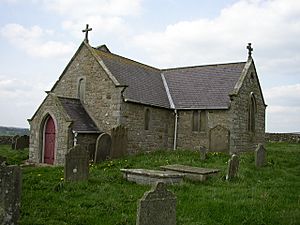St Andrew's Church, Shotley facts for kids
Quick facts for kids St Andrew's Church, Shotley |
|
|---|---|

St Andrew's Church, Shotley, from the southeast
|
|
| Lua error in Module:Location_map at line 420: attempt to index field 'wikibase' (a nil value). | |
| OS grid reference | NZ 045 551 |
| Location | Greymare Hill, Northumberland |
| Country | England |
| Denomination | Anglican |
| Website | Churches Conservation Trust |
| History | |
| Dedication | Saint Andrew |
| Architecture | |
| Functional status | Redundant |
| Heritage designation | Grade II |
| Designated | 15 April 1969 |
| Architectural type | Church |
| Groundbreaking | 1769 |
| Completed | 1892 |
| Closed | 1971 |
| Specifications | |
| Materials | Stone, slate roof |
St Andrew's Church, Shotley, is an old Anglican church located high up on Greymare Hill in Northumberland, England. It stands in a quiet, isolated spot, about 293 meters (960 feet) above sea level. This church is a special building, protected as a Grade II listed building. This means it's important for its history and design. Today, it is no longer used for regular church services and is looked after by the Churches Conservation Trust.
Contents
History of St Andrew's Church
When Was St Andrew's Church Built?
St Andrew's Church was built in 1769. It replaced an even older church that stood on the same spot.
Changes Over Time
In 1837, a new church called St John's Church was built several miles south. This new church took over many of the services that St Andrew's used to hold.
During the 1800s, St Andrew's Church faced some problems. The ground beneath it started to sink because of nearby mine workings. To fix this, the church was rebuilt and updated in 1892.
Becoming a Protected Building
St Andrew's Church stopped being used for regular worship on October 29, 1971. It was then officially given to the Churches Conservation Trust on April 13, 1973. The Trust now cares for the building, making sure it stays safe for future generations.
Architecture and Design
What Does St Andrew's Church Look Like?
St Andrew's Church is built from rough stone blocks and has a roof made of slate. The church has a unique shape, like a cross, with four arms of equal length. It has a main hall called a nave and a special area for the altar called a chancel. There are also two side sections, known as transepts, one on the north side and one on the south.
Special Features of the Church
- Porch: On the south transept, there is a small entrance porch with a pointed roof.
- Windows: Above the porch and on the sides of the church, you can see single, round-headed windows. At the west end, there is a pointed window. In the chancel, there are pairs of tall, narrow windows called lancet windows.
- Bellcote: Above the pointed window at the west end, there is a simple arch that once held a bell. This is called a bellcote.
- Headstones: Some old headstones from the 1700s are attached to the outside walls of the church.
Inside the Church
When you go inside St Andrew's Church, you can see several interesting things:
- Furniture: In the chancel, there is a small table from the 1800s called a credence table, used for holding items during services. There is also a piscina, which is a basin used for washing sacred vessels.
- Memorials: The walls inside the church have special plaques that remember people who have passed away.
- Fittings: Many of the church's fittings, like a screen across the north transept, date back to the 1800s.
- Fireplace: In the vestry, which is a room where clergy prepare for services, there is a small fireplace from the 1700s.
- Benches: The porch has stone benches where people could sit.
Other Buildings Nearby
Hopper Mausoleum
In the churchyard, just northeast of the church, you'll find the Hopper Mausoleum. This is a very important building, listed as Grade I, meaning it has exceptional historical interest. A mausoleum is a building that holds the tombs of deceased people.
Other Listed Structures
There are three other buildings in the churchyard that are also protected as Grade II listed buildings:
- A hearse house, which was used to store a hearse (a vehicle for carrying coffins).
- The Chatt headstone.
- The Gibson headstone.
See also
- List of churches preserved by the Churches Conservation Trust in Northern England
 | Janet Taylor Pickett |
 | Synthia Saint James |
 | Howardena Pindell |
 | Faith Ringgold |

